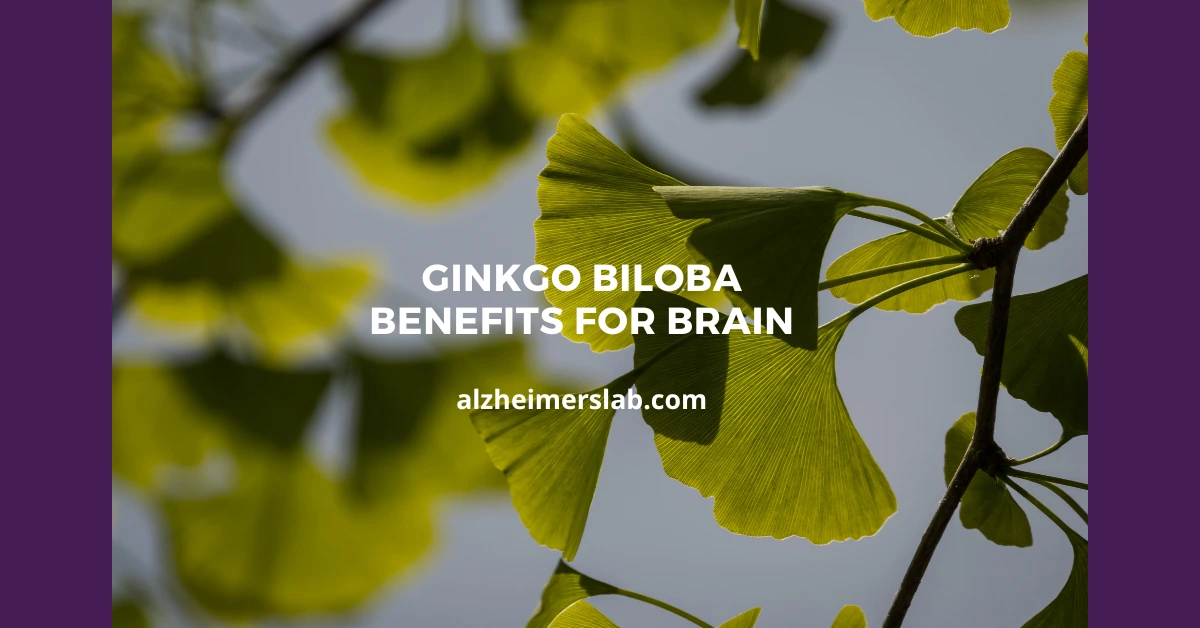Ginkgo Biloba Benefits for Brain
Before you pop another pill to boost your cognitive function, consider turning to nature for a more natural alternative. Ginkgo Biloba, a tree native to China, has been used for centuries to treat various ailments, including improving brain health.
Recent studies have shown that Ginkgo Biloba may indeed have several benefits for the brain, ranging from improving memory to increasing focus and mental clarity.
Let’s explore the Ginkgo Biloba benefits for brain health and why this natural supplement is worth considering for anyone looking to boost their cognitive function.
How ginkgo biloba became popular in the Western World

Ginkgo Biloba, a tree native to China, has been used for centuries in traditional Chinese medicine to treat various ailments, including improving brain health. However, it wasn’t until the late 20th century that ginkgo biloba began to gain popularity in the Western world.
One of the factors that contributed to the popularity of Ginkgo biloba in the West was the publication of a book called “The Ginkgo Tree” by Peter Crane in 1984. The book highlighted the cultural and historical significance of the ginkgo tree and its potential as a natural remedy for various health conditions.
Additionally, in the 1990s, ginkgo biloba gained attention from the scientific community when a study conducted in Europe found that it may have a positive effect on memory and cognitive function in elderly individuals. This study sparked further research on ginkgo biloba’s potential benefits for brain health, which helped to popularize it as a natural supplement for cognitive enhancement.
Furthermore, the rise of alternative medicine and natural remedies in the West also contributed to the popularity of ginkgo biloba. As more people began to seek out natural remedies for their health conditions, ginkgo biloba became a popular choice due to its long history of use in traditional Chinese medicine and its potential benefits for brain health.
How ginkgo biloba works in the brain
Ginkgo Biloba has been used for centuries in traditional Chinese medicine to improve brain health and cognitive function. But how does it work in the brain?
One of the main active ingredients in ginkgo biloba is a group of flavonoids called bilobalide. These flavonoids have been shown to have neuroprotective properties, meaning they can help to protect the brain from damage caused by oxidative stress and inflammation.
Ginkgo biloba also contains terpenoids, such as ginkgolides and bilobalide, which have been shown to have vasodilatory effects. This means that they can help to increase blood flow to the brain, which is important for delivering oxygen and nutrients to brain cells.
In addition to improving blood flow, ginkgo biloba has been shown to have an impact on neurotransmitters in the brain. Specifically, it has been shown to increase levels of acetylcholine, a neurotransmitter that is important for memory and learning.
Ginkgo biloba also has anti-inflammatory properties, which can be beneficial for brain health. Chronic inflammation in the brain has been linked to several neurological disorders, such as Alzheimer’s disease and Parkinson’s disease. By reducing inflammation in the brain, ginkgo biloba may help to prevent or slow down the progression of these conditions.
Furthermore, ginkgo biloba has been shown to have antioxidant properties. Antioxidants help to neutralize free radicals, which are molecules that can cause damage to cells, including brain cells. By reducing the damage caused by free radicals, ginkgo biloba may help to protect the brain from age-related decline and cognitive impairment.
The active compounds in ginkgo biloba
One of the key components of ginkgo biloba is flavonoids, a group of plant-based compounds that have potent antioxidant effects. The most abundant flavonoids in ginkgo biloba are quercetin, kaempferol, and isorhamnetin. These compounds are responsible for protecting the body’s cells from damage caused by free radicals, which can contribute to various health issues.
Another class of compounds found in ginkgo biloba is terpenoids. These include ginkgolides and bilobalide, which are believed to enhance circulation by dilating blood vessels and reducing inflammation.
Ginkgolides, in particular, have been shown to have neuroprotective properties, making them a promising candidate for treating neurodegenerative diseases such as Alzheimer’s and dementia.
Finally, ginkgo biloba contains proanthocyanidins, a type of polyphenol that has potent anti-inflammatory effects. These compounds have been shown to help reduce inflammation throughout the body, potentially lowering the risk of chronic diseases such as heart disease and cancer.
Together, these active compounds work synergistically to provide a range of potential health benefits. The flavonoids protect against cellular damage, while the terpenoids improve circulation and reduce inflammation, and the proanthocyanidins provide additional anti-inflammatory benefits.
What does the research say?
In this study, they looked at this special thing called Ginkgo biloba extract, which is often referred to as EGb761. Basically, it’s a fancy name for a type of Ginkgo biloba that they use in scientific experiments.
Now, they wanted to see what this extract could do for our brains. They checked it out in a bunch of different situations, like when people had trouble with their memory, like in Alzheimer’s disease or as they got older. They also looked at it for other brain stuff like when people had problems with their blood circulation in the brain, which can be bad for thinking and memory.
People in these studies took different amounts of this Ginkgo biloba extract, ranging from 80 milligrams a day to a whopping 720 milligrams a day. And they took it for different amounts of time, anywhere from two weeks to two whole years!
So, what’s the magic behind this extract? Well, they think it does a few things. First, it helps get more blood flowing to your brain, which is obviously important for thinking. It also seems to have some antioxidants and anti-inflammatory stuff going on, which is like giving your brain a little shield against damage. They even say it can help keep your blood from getting too sticky, like how maple syrup can make your pancakes stick together.
But, there’s a catch. This Ginkgo biloba extract might not play nice with some other medicines. They found that it could cause problems when taken with certain drugs like ones for depression or blood thinners like warfarin. So, if you’re on any medications, you should definitely talk to your doctor before adding Ginkgo biloba to the mix.
Now, there are still some questions to answer. Like, what’s the best amount to take and for how long? Are there any long-term effects, good or bad? And when is the best time to start taking it? That’s what the researchers want to figure out next.
So, in simple terms, this study shows that Ginkgo biloba extract might be like a little brain booster for memory and thinking, but you need to be careful if you’re taking other meds. And scientists are still trying to figure out all the details, so stay tuned for more brainy discoveries!
The effect of these compounds on the brain

Ginkgo biloba has gained popularity in recent years for its potential brain-boosting effects. The active compounds found in this plant, such as flavonoids, terpenoids, and proanthocyanidins, have been shown to have a variety of effects on the brain.
One of the primary effects of ginkgo biloba on the brain is its ability to improve cognitive function. Studies have found that ginkgo biloba extract can improve memory, attention, and executive function in both healthy individuals and those with cognitive impairment.
This is thought to be due to the flavonoids and terpenoids in ginkgo biloba, which can improve circulation in the brain and protect against oxidative stress and inflammation.
In addition to improving cognitive function, ginkgo biloba has also been studied for its potential in treating neurological disorders such as Alzheimer’s and Parkinson’s disease. The ginkgolides in ginkgo biloba have been shown to have neuroprotective effects, which may slow the progression of these diseases and improve symptoms such as memory loss and tremors.
Another potential effect of ginkgo biloba on the brain is its ability to reduce anxiety and depression. The flavonoids in ginkgo biloba have been shown to have anxiolytic and antidepressant effects, potentially by increasing the levels of certain neurotransmitters in the brain.
Furthermore, ginkgo biloba has been studied for its potential in reducing the risk of stroke and improving stroke recovery. The flavonoids and terpenoids in ginkgo biloba have been shown to improve blood flow in the brain, which can reduce the risk of blood clots and improve recovery after a stroke.
Overall, the active compounds in ginkgo biloba have a variety of potential effects on the brain, including improving cognitive function, treating neurological disorders, reducing anxiety and depression, and reducing the risk of stroke. While further research is needed to fully understand these effects, ginkgo biloba remains a popular natural remedy for a variety of brain-related concerns.
Benefits of ginkgo biloba for the brain
One of the most well-known benefits of ginkgo biloba for the brain is its ability to improve cognitive function. The active compounds in ginkgo biloba, such as flavonoids and terpenoids, have been shown to increase blood flow to the brain, which can enhance memory and concentration.
Additionally, these compounds have antioxidant properties, which can protect the brain from damage caused by free radicals.
Ginkgo biloba has also been shown to have a positive effect on mood. Studies have suggested that it may help treat symptoms of depression and anxiety, as well as improve overall well-being. Its ability to improve blood flow to the brain may also play a role in this benefit, as decreased blood flow has been linked to depression.
In addition to its cognitive and mood-enhancing benefits, ginkgo biloba may also have neuroprotective properties. Research has suggested that its active compounds can protect against neuronal damage and death, which may help prevent or treat neurodegenerative diseases such as Alzheimer’s and Parkinson’s.
Another benefit of ginkgo biloba for the brain is its ability to improve sleep quality. Studies have shown that it can help to regulate sleep patterns and improve sleep duration, which is essential for proper brain function.
Overall, the benefits of ginkgo biloba for the brain are numerous and significant. Its ability to improve cognitive function, enhance mood, provide neuroprotection, and improve sleep quality makes it a valuable natural remedy for brain-related health conditions.
Ginkgo biloba dosage and usage
Ginkgo biloba is a popular herbal supplement that has been used for centuries for its potential health benefits. It is often used to support cognitive function, improve circulation, and reduce inflammation. However, it is important to understand the proper dosage and usage guidelines for this supplement to maximize its potential benefits and minimize any potential risks.
The recommended dosage for ginkgo biloba supplements varies depending on the specific product and its concentration. Most products suggest a dosage range of 120-240 mg per day, split into two or three doses. It is important to start with a lower dose and gradually increase as needed, as some people may experience side effects such as headaches or digestive issues.
Ginkgo biloba supplements are available in various forms, including capsules, tablets, and liquid extracts. It is important to follow the manufacturer’s instructions for use and dosage, as well as consult with a healthcare professional before starting to take this supplement.
In addition, it is important to note that ginkgo biloba can interact with certain medications, including blood thinners and antidepressants. It is important to inform your healthcare provider about any supplements or herbal remedies you are taking to prevent potential interactions.
| Form of Ginkgo Biloba | Recommended Dosage | Recommended Usage |
| Capsules or Tablets | 120-240 mg per day | Taken with meals, for at least 4-6 weeks |
| Liquid Extract | 1-2 mL per day | Diluted in water or juice, taken with meals |
| Tea | 1-2 teaspoons of dried leaves per cup | Steeped in hot water for 5-10 minutes, up to 3 cups per day |
| Topical Products | As directed on product label | Applied to affected area as needed |
Other potential health benefits of ginkgo biloba
Ginkgo biloba is a plant with a long history of use in traditional medicine. It is best known for its potential benefits for brain function, but it also has several other potential health benefits.
1. Antioxidant effects
Ginkgo biloba contains several compounds that have antioxidant effects, including flavonoids and terpenoids. These compounds can help protect cells from damage caused by free radicals, which are molecules that can harm cells and contribute to chronic diseases.
2. Eye health
Some studies have suggested that ginkgo biloba may help improve vision and protect against age-related macular degeneration, a leading cause of blindness in older adults. This is thought to be due to the plant’s antioxidant and anti-inflammatory effects.
3. Anxiety
Ginkgo biloba may have anxiolytic effects, meaning it could help reduce anxiety symptoms. One study found that a combination of ginkgo biloba and a common antidepressant medication was more effective at reducing anxiety than the medication alone.
4. Asthma
Ginkgo biloba has been studied for its potential to improve symptoms in people with asthma. Some studies have suggested that it may help reduce inflammation and improve lung function.
5. Sexual dysfunction
Ginkgo biloba may have potential benefits for sexual function, particularly in men. Some studies have found that it may improve erectile function and libido.
It’s worth noting that more research is needed to fully understand the potential health benefits of ginkgo biloba, and the plant may not be effective for everyone. Additionally, it may interact with certain medications, so it’s important to speak with a healthcare provider before taking ginkgo biloba supplements.
Conclusion
Ginkgo biloba has numerous potential health benefits for the brain, making it a popular herbal supplement among those looking to improve cognitive function and overall brain health. The active compounds in ginkgo biloba have been shown to increase blood flow to the brain, protect against oxidative stress, and support neural communication.
While more research is needed to fully understand the extent of its effects, ginkgo biloba has shown promising results in improving memory, attention, and mental performance in some studies.
Have you tried ginkgo biloba as a supplement for brain health? What has been your experience? Share your thoughts and experiences in the comments below.

